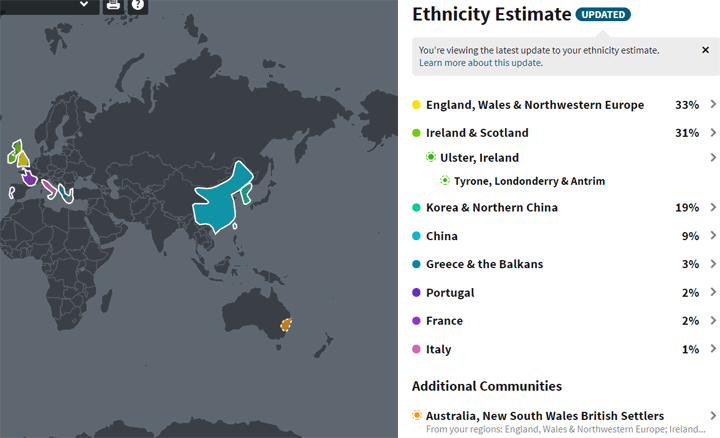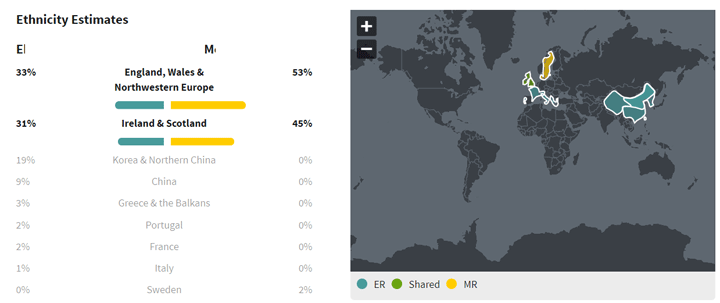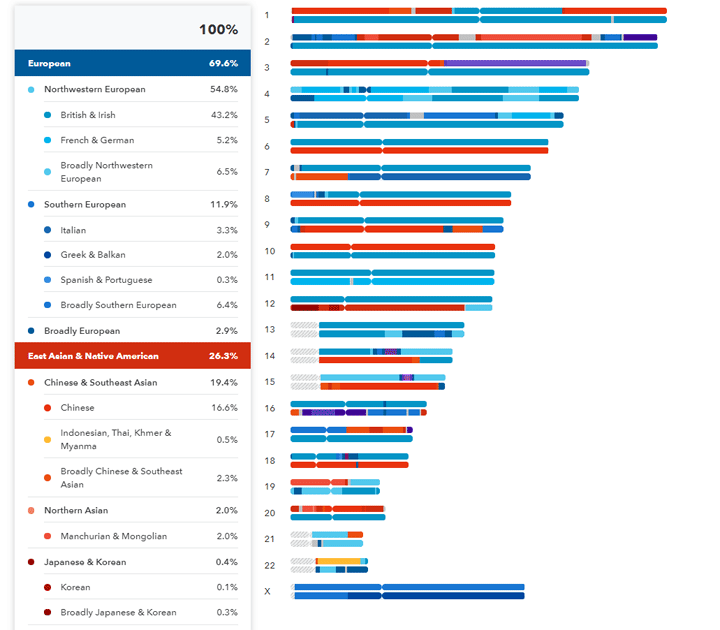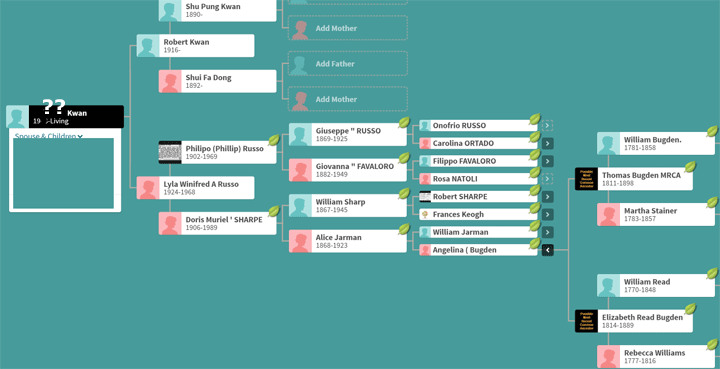Recently ethnicity was a major factor in figuring out the family of the mystery father of an Australian women of mixed heritage: Chinese, Italian, and English/Irish.[UPDATE 4-APR-2020: no help needed, all resolved now.]We still need some help, so any Australian readers please read to the end.

Elana’s ethnicty on Ancestry after the update, before she had lots more Italian
This case is unusual because for those of us with primarily European ancestry, the ethnicity predictions from the various DNA test companies are not accurate enough to be a significant aid with figuring out unknown parentage situations. For one thing, our ancestors moved around more than you might expect, and for another, the science is just not exact enough yet.
Too often I get a panicked email or comment from someone who is worried that Daddy is not their dad, or perhaps grandad is not, because their ethnicity predictions show no German or French or Bulgarian which he was and where is that Norwegian from? To which I respond, check your matches, if you have matches to cousins from his family, all is well, it’s just the inaccuracy of ethnicity predictions. North Europeans and South Europeans are fairly distinct from each other, but countries as we know them today did not exist in the far past.
In Elana’s case, having East Asian and Southern European in addition to the usual Australian British mix, actually gave us some different and potentially useful data to work with. Her mother seemed entirely English, Welsh, Scottish and Irish, a frequent blend for an Australian. She remembers that Elana’s father said he was part Maori and that his name was Bob. There is no Maori in her results shown above (it usually looks Polynesian), so likely he was just trying to make himself seem exotic and interesting.
Since Elana’s mother tested also, we could see that Elana had no close matches that were not listed as “Mother’s side” on Ancestry which made the search very difficult. Her paternal matches consisted of only one 3rd cousin, an American of Italian ancestry, and lots of 4th cousins, quite a few with trees, and most of the closer ones were of Italian descent, in spite of only 7% Italian listed in her Ancestry ethnicity.
One possibility for so few paternal matches was related parents. We checked that by uploading to GEDmatch.com (click here for my post on related parents) and that was not the case. The other more likely explanation was very few of her father’s relatives had tested. For example, Elana had only one very distant Asian match in spite of her father clearly having half that heritage.
Since we could see both Elana’s ethnicity and her mother’s it was easy to tell that Elana’s unknown father was half Chinese/Korean with an Italian (great) grandparent. These were her initial percentages before the recent update at Ancestry:
65% England/Scotland/Wales (so her father will have about 15%)
16% Korea and Northern China
12% China
7% Italy
I asked Elana to also test at 23andme and to upload her Ancestry results to MyHeritage and Family Tree DNA as well. Still no luck finding close paternal matches.
One interesting piece of information from her 23andme test was that her X chromosome has no Asian ethnicity at all. How is that possible since her father was half East Asian?
Since men give sons a Y not an X, the way that she would get no Asian in her X would be that her father’s father was the Chinese/Korean individual.
After the recent update at Ancestry Elana’s Italian went down to 1%, but 23andme shows 11.9% Southern European and they are often the most accurate on this. So my theory was now that Elana had an Italian great grandparent. Ancestry shows the total of Greek, Portuguese, French, and Italian at 7%. So what part of Italy has that mix? Sicily is the crossroads of the Mediterranean…
Normally we look for where the family trees of the different cousins on the father’s side converge, with so few matches would it be possible to use ethnicity? The plan is to look for a man with an East Asian father and a mother with one Italian descended parent and the other of Australian English descent.
So I asked Elana to star all the paternal side matches to make it easier to use automation (click here for my post on that). The idea was to use Genetic Affairs (GA) to cluster just her matches on her dad’s side and show some trees for common ancestors. More recently, GA has added some rule based ways to select matches but both people have to be shared with the account being used.
The next step was to run a DNA2tree which has the option to gather the matches which are “not in common” with the first favorite. Thus adding a star to her tested mother let us use that option. A very large number of her more distant 4th cousin matches were descended from a Thomas BUGDEN 1811-1898 so I had DNA2tree build that tree for our search. This looked like her dad’s Australian side.
The plan was to build that tree down until we found a Bugden descendant marrying an Italian and their daughter marrying an East Asian man. DNA2tree only lists the children with DNA match descendants, of which there were five, so I had to add the other 12 children, one of whom was likely her ancestor. Time to recruit some help. I got Peter O’Brien, a search angel in Australia who had helped me before, to go to work on that tree. Building a tree of Bugdens with that many branches was going to be quite a chore.
Often in these cases it is better to start with the common ancestor with fewer children, so perhaps the Italian side? Another useful technique is, if you have the surnames from the one side, to look for them in the other side’s trees. Our Italian helper, Rocco Joseph Hindman, said look for the surnames RUSSO or Tesoriero. He had looked at the Mollica common ancestors found by DNA2tree but closer study showed that in that Mollica family there were two related Russo spouses. Endogamy also seemed to be a factor among those Sicilians.
Peter found a Bugden descendant who had married a RUSSO! And their daughter Lyla married twice, once to someone named Robert Kwan, who was born in China to Shu Pung Kwan and Shui Fa Dong. Robert and Lyla lived in the greater Sydney area and had two sons in about the 1950s. The problem now is to find them. One of them is Elana’s father. I can supply their names and likely birth years to anyone who wants to help, but my policy is never publish the names of the living without permission.
It is much harder to find people who are alive, especially in a country I am not familiar with, usually it is via obituaries of their parents. If I have any Australian readers who can help with this, please contact me. A closer cousin, that Elana is in now in touch with, thought that one of those sons is an actor. All clues and ideas are welcome!
UPDATE 10 Mar 2020: No help is needed any more. Elana is now in touch with her father. Sadly he was married at the time of his encounter with her mother so this has not gone over very well with his wife!





I always discourage people from using ethnicity when relating to unknown parentage, or just research on their tree. Why? For the exact same reason you said, as most of these people are of primarily European background and it’s not accurate enough to be an aid in finding ancestors.
In my mother’s case, however, based on the fact that she told me that she remembers meeting her father of whom she described as a “pure Hawaiian” man, and the fact that my mother came up consistently as 17% European, I knew that the foreigners to the Hawaiian islands would be on her mother’s side and there were multiple ancestors of European background that gave her that unusual percentage. Not to mention, her mtDNA was identified as the Polynesian motif. So a direct (distant) maternal ancestor could’ve only been Hawaiian, but knowing that her daughters could be admixed as this was my mother’s side of the family.
And turned out, she just so happened go the higher end of the European vs. her Polynesian/Hawaiian side, but this was discovered AFTER I found my mother’s biological family. Genealogically my mother is 14.8375% European.
After finding the family and meeting my mother’s sister, she volunteered to test and her sister came back 15% European. More in line from what they inherited from their mother.
Two of my brothers who tested, come back having 8% European (younger brother) and 9% European (older brother). That’s about half of what my mother has – 17%. I on the other hand got 11%, a bit on the higher end.
So yes, it can be helpful if dealing with other continents. Other than that, people should be careful how they use such info. as it’ll lead them in the wrong direction.
Great comment Kalani, thanks. I got 28% from my Jewish grandad so yes it can be quite unequal. Sadly my niece only got 17% from my wonderful Norwegian dad!
One European ethnicity that I did not mention which is quite different from the others is Ashkenazi Jewish, but then I have many posts here on that topic
-I have found some possible links, maybe your Australian ctcs can move forward on this. Will send a email directly.
Cheers, GJohns
I looked at my ancestry breakdown by parent. It confirms what I already knew: “old” French, as in French Canadian, is misattributed as English, most likely, in my case. I have seen this with other people as well. I learned my maternal grandfather was adopted. His mother was French Canadian, so I should have been increased by 12-13% for French. What is even more amusing is that there at least two lines of shared ancestry, yet hers is not picked up? I haven’t crunched the numbers to see if I agree with the 30% French for my father. It seems the “fresh” infusion for English and Scottish of his grandfather from London is overrepresented in his ancestry.
Ethnicity I rank lower. I place more stock in surnames and places in matching trees, up to a point. The uncorrected tree is more rule than aberraton.
Pingback: Friday’s Family History Finds | Empty Branches on the Family Tree